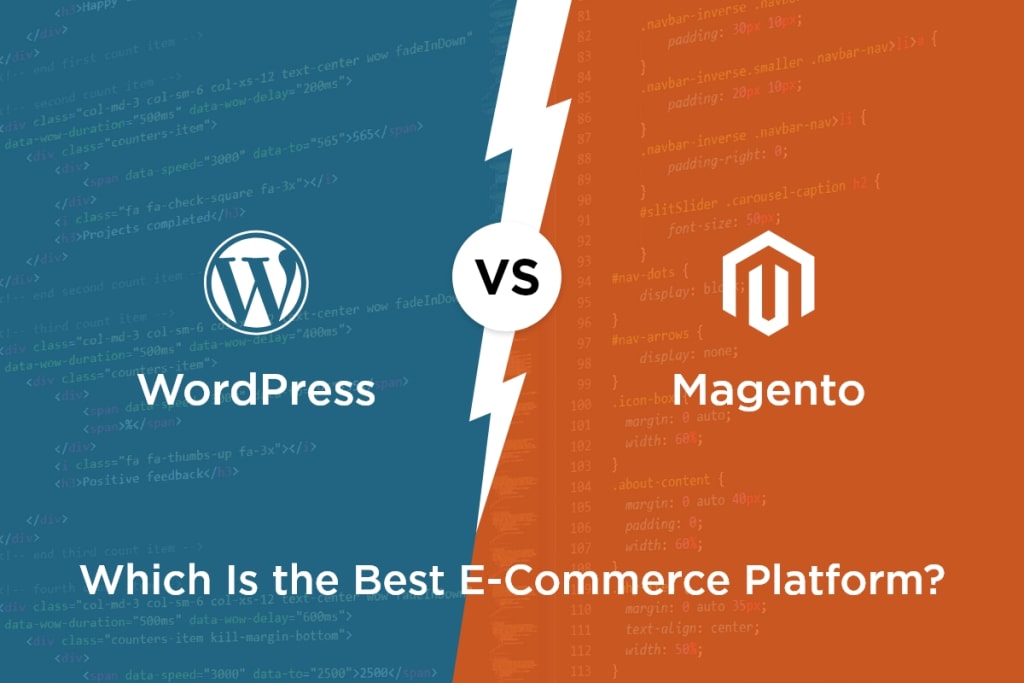Magento vs. WordPress: Which is the Ultimate Choice For an eCommerce Store?
When developing an eCommerce store, several overwhelming options are available. Today, we point out the differences between two major choices, Magento and WordPress.

The number of platforms available makes a choice overwhelming when you want to build an eCommerce website. A few dedicated content management systems make running an online store easy, but those can be pretty expensive. Fortunately, there are two best open-source platforms available for free, and these two options are Magento and WordPress.
However, you can choose one option only for your eCommerce store, and hence you need to come up with the most suitable option. This article lists some significant differences between the two to help business owners make a definite choice when hiring eCommerce website development services. Looking for notable differences between Magento and WordPress, we have your needs covered.
WordPress vs. Magento
WordPress
WordPress is an open-source content management system and a famous blogging platform. The platform is user-friendly and enables even beginners to work smoothly on it to get their website developed. The platform is also famous for easy third-party plugin integrations and template customizations. No matter what functionality you are trying to achieve in your website, you will easily get a plugin available to get the task achieved.
Magento
Just as WordPress, Magento is also based on open-source technology. This platform has numerous dedicated eCommerce functions that multiple online store owners endorsed. Additionally, the platform offers high-level customization and functionalities that allow store owners to customize their websites completely.
Magento offers several comprehensive features that include reporting, multi-store management, marketing, mobile commerce, search engine optimization, and other necessary management tools.
Pros and Cons
Pros of WordPress
- Hosting providers can install WordPress software and its themes without any coding knowledge.
- The platform is not limited to eCommerce, which means you can build a store that excels in other areas, too, such as content marketing.
Cons of WordPress
- WordPress doesn't, by default, offer eCommerce functionality. A plugin known as WooCommerce needs to be installed.
- Endless opportunities for features are available; however, a plugin needs to be installed for each one.
Pros of Magento
- Magento is a more scalable and robust platform to support bigger stores and at the same time help smaller ones grow.
- eCommerce functionality is by default available with Magneto and several other inventory and sales features.
Cons of Magento
- The platform is not for beginners; one needs to have sufficient coding language.
- When using the platform for a huge website, you will have to pay some charges since it will add up swiftly.
Key Differences
- Ease of Use
WordPress is easier to use than Magento since WordPress was developed keeping beginners in mind. On the contrary, Magento is more for professional developers, or if you are not versed in the platform, outsource it to an eCommerce web design company.
- Marketing and Content Management
WordPress is a better choice as compared to Magento when it comes to marketing and content management system. Speaking technically, WordPress itself is a content management system, and the platform was started primarily as a blogging platform. Though it allows the development of all kinds of websites, since originality is to handle content, it can handle large amounts of media and content.
On the contrary, with Magento, you will have to custom add the blogging features since it is not inbuilt.
- Themes and Design Customization
Both platforms have strong design capabilities; however, the type of design that you want will depend on the kind of website you are developing. Ready-made and custom themes are available on both platforms, and custom themes will require coding knowledge. The ready-made themes on both choices are cheaper and easy to use. The custom themes are a bit expensive, high-quality, and offer unique functions and features.
Based on the type of website you want to get developed, you need to choose the platform that will be suitable.
- Product Management
Both Magento and WordPress are tough contenders when it comes to product management. A range of options is offered for organizing and managing products on the eCommerce store. Both the platforms enable users to employ multiple product types, support variations for the dropdown menu, allow integration with external shopping carts, etc. However, Magento's range of options is extensive compared to WordPress.
- SEO
Magento and WordPress are capable of getting integrated with SEO tools that include SEO plugins, Google Analytics, and Google Search Console (formerly known as webmaster tools). However, the variety and range of features are incredible for Magento compared to WordPress.
- Security
It is integral for eCommerce websites to have tight security since users need to enter their card details for online shopping. Both Magento and WordPress offer high security to get eCommerce websites developed. Both the platforms have existed for quite some time now, and so they have gone through adequate shares of security updates.
Additionally, the security of websites can be enhanced with the help of plugins and extensions.
Magento vs WordPress - Similarities
As mentioned earlier, both platforms are open-source solutions. That said, both provide endless customizability and disability, and it means you can control every bit of your online business. The platforms are free to download, but you cannot own a website for free.
You will have to pay for the hosting, domain name, extensions, and plugins, along with some extra maintenance and development fees. All of these will cost you a pretty penny, along with the charges of hiring eCommerce website development services.
Conclusion
Depending on your needs and priorities, you can choose a platform suitable for your online store. Hire an eCommerce web design company to develop a highly scalable and secure online store. Magento is one of the most effective and highly recommended alternatives to WordPress to sell products online. Magento remains the ultimate choice for selling products online with increased functionalities and features.
About the Creator
Vikrant Bhalodia
An Avid Writer by nature. Head of HR & People Ops | OD Expert @ WeblineIndia, a leading Software Development Company in USA & India.






Comments
There are no comments for this story
Be the first to respond and start the conversation.